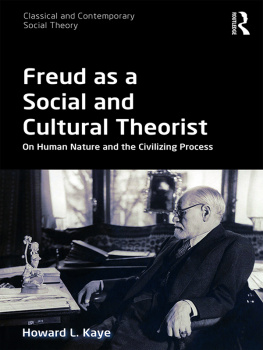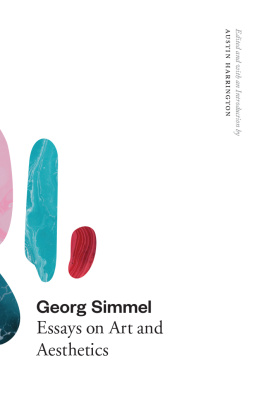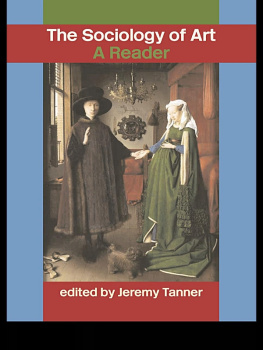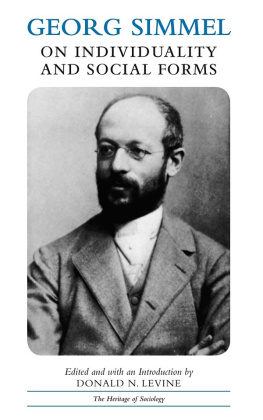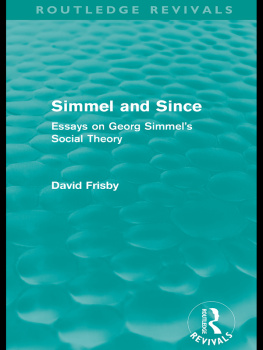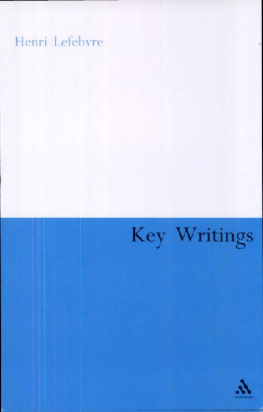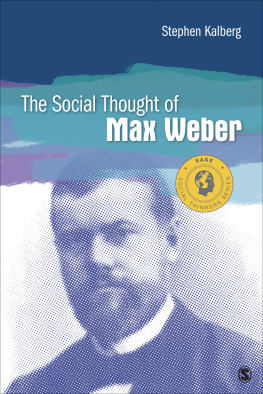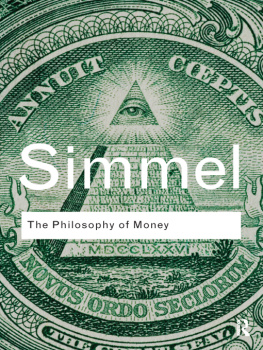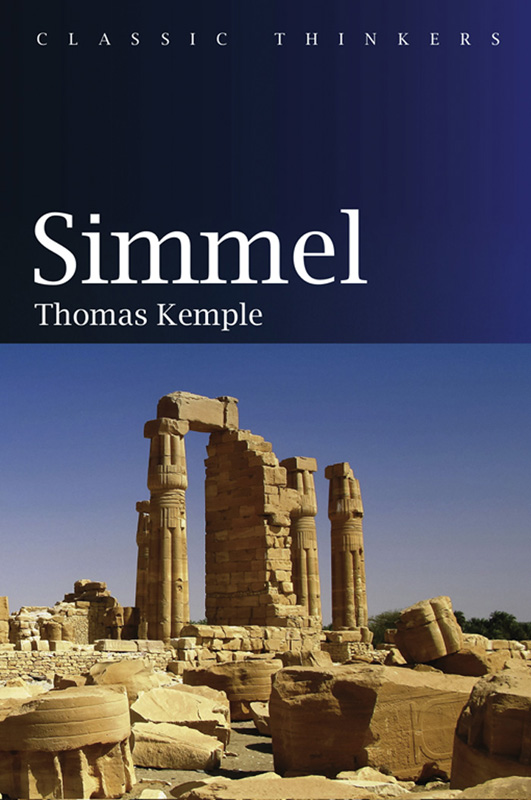Table of Contents
List of tables
List of figures
Guide
Pages
Classic Thinkers
Richard T. W. Arthur, Leibniz
Terrell Carver, Marx
Daniel E. Flage, Berkeley
J. M. Fritzman, Hegel
Bernard Gert, Hobbes
Thomas Kemple, Simmel
Dale E. Miller, J. S. Mill
Joanne Paul, Thomas More
A. J. Pyle, Locke
James T. Schleifer, Tocqueville
Andrew Ward, Kant
Simmel
Thomas Kemple
polity
Copyright Thomas Kemple 2018
The right of Thomas Kemple to be identified as Author of this Work has been asserted in accordance with the UK Copyright, Designs and Patents Act 1988.
First published in 2018 by Polity Press
Polity Press
65 Bridge Street
Cambridge CB2 1UR, UK
Polity Press
101 Station Landing
Suite 300
Medford, MA 02155, USA
All rights reserved. Except for the quotation of short passages for the purpose of criticism and review, no part of this publication may be reproduced, stored in a retrieval system or transmitted, in any form or by any means, electronic, mechanical, photocopying, recording or otherwise, without the prior permission of the publisher.
ISBN-13: 978-1-5095-2110-4
ISBN-13: 978-1-5095-2111-1 (pb)
A catalogue record for this book is available from the British Library.
Library of Congress Cataloging-in-Publication Data
Names: Kemple, Thomas M., 1962- author.
Title: Simmel / Thomas Kemple.
Description: Medford, MA : Polity Press, [2018] | Series: Classic thinkers | Includes bibliographical references and index.
Identifiers: LCCN 2018020993 (print) | LCCN 2018031201 (ebook) | ISBN 9781509521142 (Epub) | ISBN 9781509521104 (hardback) | ISBN 9781509521111 (pbk.)
Subjects: LCSH: Simmel, Georg, 1858-1918Political and social views. | SociologistsBiography. | Social sciencesPhilosophy.
Classification: LCC HM479.S55 (ebook) | LCC HM479.S55 A58 2018 (print) |DDC 301.092 [B]dc23
LC record available at https://lccn.loc.gov/2018020993
Typeset in 10.5 on 12pt Palatino
by Toppan Best-set Premedia Limited
Printed and bound in Great Britain by CPI Group (UK) Ltd, Croydon
The publisher has used its best endeavours to ensure that the URLs for external websites referred to in this book are correct and active at the time of going to press. However, the publisher has no responsibility for the websites and can make no guarantee that a site will remain live or that the content is or will remain appropriate.
Every effort has been made to trace all copyright holders, but if any have been overlooked the publisher will be pleased to include any necessary credits in any subsequent reprint or edition.
For further information on Polity, visit our website: politybooks.com
Illustrations
Abbreviations
for more information on various editions of Simmel's works.
GSG = (19892015) Georg Simmel Gesamtausgabe [Georg Simmel Collected Works], 24 vols, ed. O. Rammstedt et al. Frankfurt am Main: Suhrkamp |
ISF = (1971) Georg Simmel: On Individuality and Social Forms, ed. D. N. Levine. Chicago: University of Chicago Press |
PM = (2004) The Philosophy of Money, trans. T. Bottomore and D. Frisby. London: Routledge |
S = (2009) Sociology: Inquiries into the Construction of Social Forms, 2 vols, ed. H. Helle, trans. A. J. Blasi, A. K. Jacobs, and M. Kanjirathinkal. Leiden: Brill |
SC = (1997) Simmel on Culture, ed. D. Frisby and M. Featherstone. London: Sage |
VL = (2010) View of Life: Four Metaphysical Essays with Journal Aphorisms, trans. J. A. Y. Andrews and D. N. Levine. Chicago: University of Chicago Press |
For Martha Garland
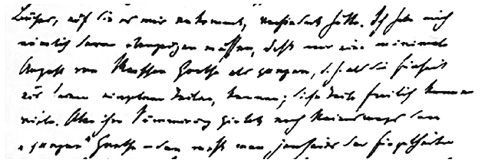
I have had to convince myself that only a few people know Goethe as a whole, that is, as the unity of his parts; these parts, to be sure, are known to many. But their sum does not yet by any means yield the whole Goethe for him one must look beyond the particulars.
From a letter Georg Simmel wrote to Marianne Weber, 9 December 1912, to whom he dedicated his book Goethe (GSG 23: 146; facsimile in 1959: 241. Courtesy of Arnold Simmel)
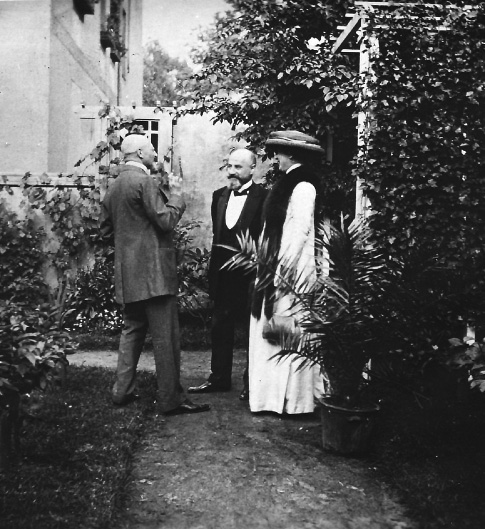
Open house in Berlin's Westend, summer 1914
(courtesy of Cornelia Hahn Oberlander)
Preface and Acknowledgements
An old black and white photograph captures a moment in time, as if to freeze the flow of events under the aspect of eternity (sub specie aeternitatis). A woman and two men in their Sunday best are standing in a lush garden, the one on the left talking animatedly and gesticulating with his hands to the man in the dinner jacket and the woman in the large hat and fur stole. They are all smiling, if only for the photographer, but must be very hot in the summer heat. They are evidently not strangers but appear to be familiar with one another, a trio related through friendship, through family, or in other ways. The handwriting on the back of the photograph notes that the man speaking is the philosopher and sociologist Georg Simmel, and that the setting is an open house in summer 1914 at the home of the economist and historian Ignaz Jastrow, at 14 Nussbaumallee in Berlin's Westend. Jastrow is standing in the centre next to Simmel's wife, Gertrud, and the inscription points out that she wrote books of philosophy under the pseudonym Marie Luise Enckendorff. Simmel is making one of his characteristic gestures, as if to grasp an idea from the air and twist it around in his hand. The people in the picture are not at a formal lecture or a scripted seminar at the university, of course, but simply taking part in a sociable gathering and an improvised conversation. As Simmel's son Hans later recalled, exchanges like this one were a regular feature of social life among these circles of colleagues, families, and friends: He was a master of conversation, but not interested in discussion in the usual sense of the term . What he found essential and interesting was to fasten on to a word or opinion that would expand the conversation, or to offer remarks with some constructive new point of view (H. Simmel 1958: 254; similar remarks are made by students, in Stewart 1999: 7; Gassen and Lassmann 1958: 160, 228).
The date, summer 1914, is significant for both personal and historical reasons. Simmel and Jastrow, who met in the late 1880s and became best friends and neighbours, had recently been separated when the Simmels moved to Strasbourg a few months earlier (GSG 23: 34950, 356n). After almost thirty years as a popular lecturer at Berlin University, and despite publishing many well-regarded books and articles, Simmel had finally been called to take up his first post as a full professor. His friend continued to lecture at Berlin University where they had been colleagues, but he had recently been dismissed from his teaching position at the Commercial College he had co-founded, an injustice Simmel vehemently protested in a newspaper editorial as a violation of academic freedom (GSG 17: 11518, 4635). Just a few weeks after this photograph was taken, the lives of these individuals and of many others in their social circle would be decisively transformed with the outbreak of the First World War in August 2014. As Simmel reflected melancholically in a letter to the Jastrows almost exactly a year later, the war placed a period where I had at first only expected a semicolon. I am convinced that a new world era is beginning & that I shall belong to the old (quoted in Goodstein 2017: 338; GSG 23: 5345).


